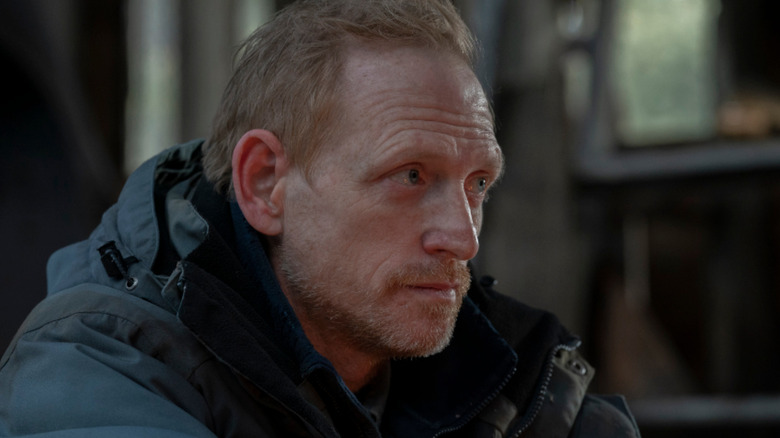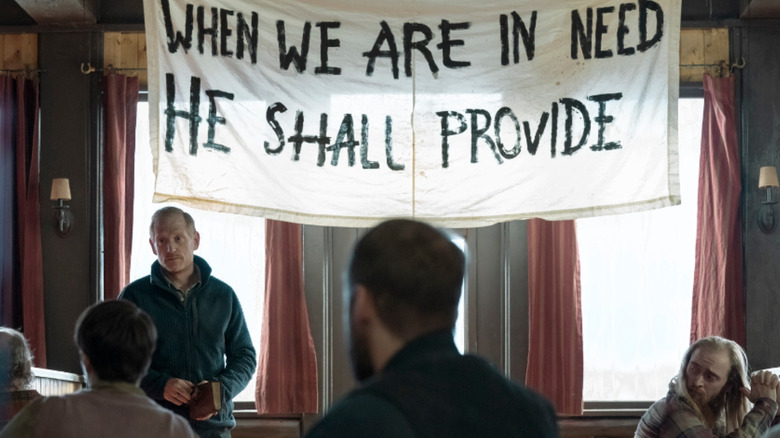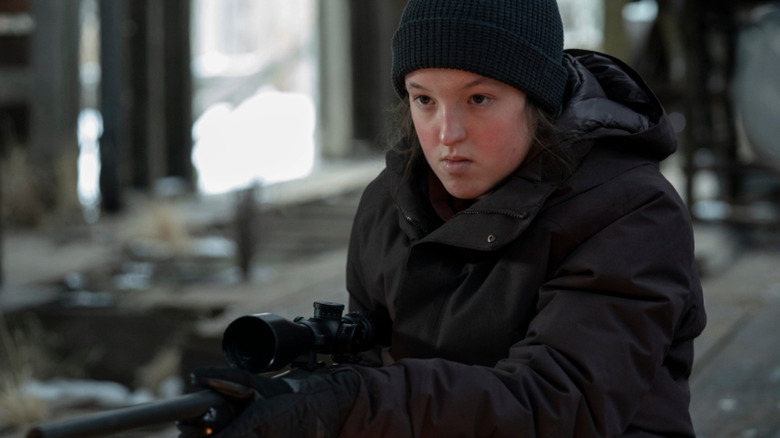The Last Of Us Ties Into A Terrifying Real-World Truth About Cults
This piece contains spoilers for "The Last of Us," and discusses topics that may be disturbing for some readers.
"When We Are In Need" is probably one of the episodes of "The Last of Us" that fans were dreading the most, and understandably so. It centers around the unnamed cannibal cult in the mountains of Wyoming, led by the soft-spoken David (Scott Shepard). Considering their appearance in the original game was a pivotal turning point, they were always bound to be a crucial part of the show. That doesn't necessarily mean everyone was excited to see David and his cronies torture Ellie (Bella Ramsey) while Joel (Pedro Pascal) recovers from his stab wound. Seriously, can these two catch a break for once?
It's already been established that the biggest change between the original game and its television adaptation is that it allows for more perspectives to be seen. Such is the case with the cult, who are portrayed as meek and easily manipulated. Combined with their strict religious beliefs and their devotion to their "father," it's pretty easy to see why this group would be considered a cult. Unfortunately, there really isn't a huge difference between the cult in "When We Are In Need" and the real ones that have left their mark on mainstream history and culture.
Faith in times of turmoil
According to a 2021 study, online searches for various religious sectors increased by an average of 10% during the early months of the COVID-19 pandemic. Religions like Christianity, Islam, and Judaism certainly should not be considered cults by themselves, and everyone is free to practice whatever religion speaks to them the most. That being said, this study does prove that times of crisis can often lead to more people seeking comfort in external belief systems.
Such was the case of David in "The Last of Us," at least, so he claims. When he first meets Ellie in the woods, she questions why he would want to follow God after the cordyceps outbreak. He claims that he was never a religious man before the apocalypse, but found purpose and solace in religious teachings afterward, picking up like-minded individuals along the way.
When you look back at the various cults that have popped up over the years, this isn't surprising. Charles Manson formed his Family in the midst of anti-Vietnam War sentiment, NXIVM started off as a self-help direct marketing group right before Y2K, and Jim Jones manipulated the anti-racist rhetoric of the civil rights movement to form Jonestown.
But this doesn't mean that people only join cults during a universal panic. Cult-recovery therapist Rachel Bernstein told Insider that even personal times of crisis, such as experiencing a distressing situation or recovering from an illness, can make certain people susceptible to joining a cult. This is because, no matter what, cults advertise themselves as a saving grace from the turmoils of the real world.
He shall provide
When there is fear and anxiety stoked among a large population, a lot of people are going to find something to cling to. And when specific people are in need of comfort and purpose, there are going to be others that want to exploit that. Those types of people are the seemingly charismatic but demented cult leaders, many of whom exhibit violent urges or practices.
In "The Last of Us," both the original game and the HBO series, David is one such person. He considers himself the teacher, the father, and the shepherd of his congregation, all of whom treat him like he's the one true authority. While we don't get to see much of the cult's inner workings, we at least know that David is violent enough to hit grieving children with no remorse. Considering how he's also forcing his followers to unknowingly eat human flesh, who's to say what else he was capable of doing to them?
If there is any lesson to take away from this week's episode of "The Last of Us," it's to be careful about who you turn to in times of need. Taking solace and comfort in a higher power is certainly helpful for some, but when one particular person says that they or their group can help alleviate you, it's best to turn them away. Be like Ellie, who never caved into David's lies of prosperity and attempts at manipulation, despite the circumstances she was forced into.


